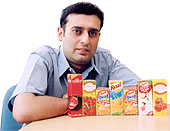 |
Amit Burman, CEO of Dabur Foods, is a farmer at heart. He has to be; farm products are where his business is. But Burman is no bucolic yokel. He sports a string of degrees to his name.
?My professional education started with a BSc degree in industrial engineering from Leigh University in the US,? says Burman. ?To gain further knowledge in the field of industrial engineering, I got a masters from Columbia University in New York. Then came an MBA from the University of Cambridge in England. This equipped me with a sound knowledge of HRD, marketing, corporate finance and the other facets of business.
?Fresh out of Cambridge, I joined the New York-based Tishcon Corporation as a trainee and was accountable for the safety of stock and optimum inventories. It was followed by a stint in the manufacturing strategy department of Colgate-Palmolive in New York.
?After my initial training at Tishcon and Colgate, I came back to India. It was then that my career took off. I joined Dabur India as an engineer in 1992. I handled Dabur?s industrial engineering department where my responsibilities included improving product packaging. I found it frustrating that natural, packaged fruit juice (which was a common breakfast beverage across all age groups in the US) was not available in India. Indian consumers did not have this basic option in spite of our country being the second largest producer of fruits and vegetables in the world.
People were more used to drinking juices from local juice shops, which were unhygienic. I realised this need gap and Dabur India launched Real, India?s first preservative-free juice.
?In 1999, Dabur Foods was born, a 100 per cent subsidiary of Dabur India. Hommade was launched after detailed research among Indian housewives about their cooking habits and associations. At that time, there was a complete absence of international-quality, packaged food products that were made in India.
?My inherent interest in the packaged foods segment paved the way for my career and there was no looking back. Urbanisation, nuclear families, rising health consciousness and exposure to international lifestyles were all indicators that India was ready to experience an era of packaged foods.
?The entrepreneurial bug bit me and from 1992 onwards I worked my way through several junior functions in our parent company? Dabur India. The company was actively looking at future growth areas and I thought this would be the right time to strike out and start a business of my own.
I zeroed in on the processed foods category that was predicted to be the next sunrise sector. I felt that Dabur was in an ideal position to develop the potential of the processed foods category due to its expertise in creating and marketing successful brands and understanding the consumers.
?In the initial years, we faced several bottlenecks like high consumer barriers to acceptance of packaged foods, changing the price perception, offering the ?right? taste to cater to the distinct consumer palette and changing focus from out-of-home consumption to in-the-home consumption. Indian consumers were surrounded by several myths about packaged foods. We gradually built trust by offering quality products.
?It has been an uphill task. But it gives me a lot of satisfaction when I look back at the past 10-12 years. We have been able to mould Dabur Foods into a successful food services company. It is now among the few Indian success stories in the processed food sector. We even set up a separate food services division in 1998 to cater to the institutional segment.
?We are extremely proud of our state-of-the-art multi-fruit processing unit in Siliguri, West Bengal, which is the largest of its kind in India. The plant will reach its target production and we will export finished products and pulp products worth Rs six crore by the end of the financial year.
?Dabur Foods is also credited with being a major catalyst in changing the image of the Dabur Group: from the traditional company whose brand portfolio catered to a more semi-urban and rural consumer, to a contemporary company whose brands are an active part of the urban consumers? choice set.
?Our aim is to become a world-class food services company that offers high quality brands for the retail consumer, a range of food products and services for the institutional consumer and an exporter of concentrates that will support other food companies across the world.?
Burman is sure he will succeed. After all, he has the Real thing.










